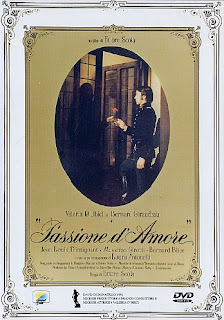This is a twin post with Creative Barbwire. I'm going to tell you about a classic Italian novel , FOSCA by Iginio Ugo Tarchetti (1869). Barbara is going to review the movie PASSIONE D'AMORE (1981), by Italian director ETTORE SCOLA , based on that novel. Go, visit her blog and read her post.
After a passionate but ill-fated love affair with the beautiful married woman Clara, the young army officer Giorgio is transferred from Milan to Parma, where he meets the sickly and unattractive Fosca, the cousin of his commander. Although initially repelled by her, he becomes fascinated by her and slowly succumbs to her morbid, manipulative charms.
A witty and satirical critique of romance, desire and bourgeois sexual conventions, Tarchetti sophisticated and controversial novel is a masterpiece of nineteenth-century Italian decadent literature.
A REVIEW
FOSCA is considered the best achievement in Tarchetti’s work. He was one of the main representatives of “la Scapigliatura milanese” . He worked on this novel until his death for thyphus on 25th March 1869. He couldn’t finish it. The missing part, the nocturnal love scene between Giorgio and Fosca , was written by Tarchetti 's friend, Salvatore Farina, to make publication possible. Fosca was printed in instalments on the literary magazine “Pungolo” that year.
The story is written in the form of a diary in which Giorgio, a young officer, tells about his love affairs with two different women. Those relationships, especially one of the two, deeply marked his life and his conscience.
Five years before he had retired from the Army for a heart desease and then gone to Milan where he had met Clara, a very beautiful young woman, married, with whom he had had an intense love affair.
After only two months of intoxicating happiness, Giorgio, healed both in his body and in his soul, had had to go back to active service and he had been sent to a monotonous small town located in a desolated natural environment.
There he had met Fosca, the cousin of his Colonel, a horribly thin woman worned by a mysterious psycho-physical desease. Since his first meeting with Fosca, Giorgio realizes Clara’s image in his mind and heart becomes more and more distant, forcibly substituted by Fosca’s. His passion for the ugly but sensual sick woman had become a desease sucking his vital energy .
The two women, Clara (from the Latin word corresponding to the adjective light, luminous) and Fosca (arcaic for dark) contrast not only in their exteriority (beautiful/ugly, blonde/dark –haired, healthy and active/ ill and passive) but also in their embodiment of love. Clara stands for Romantic love: adultery lived as freedom from the social constraints of perbenism; Fosca embodies love according to the Scapigliati, seen in its morbid, pathological implications connected to desease and death.
Fosca appears extraordinarily horrible but intensely attractive at the same time . Can a story like this still be fascinating in our world of physical perfection and fitness mania? Might a Fosca still attract a handsome healthy young Giorgio? However, what makes this novel appealing to a modern reader is the restlessness which pervades the story. The doubt, the dichotomies, the contrasting realities of life and the self.
This classic from Italian literature has been translated into English as Fosca or as Passion. You can read an excerpt in English HERE or HERE.
This book has been adapted for the screen in 1981 as Passione d'Amore by Italian director Ettore Scola . The movie was presented at 34th Cannes Film Festival. Now you can move to Creative Barbwire Blog and read her review of this beautiful costume film.
This book has been adapted for the screen in 1981 as Passione d'Amore by Italian director Ettore Scola . The movie was presented at 34th Cannes Film Festival. Now you can move to Creative Barbwire Blog and read her review of this beautiful costume film.




0 comments:
Post a Comment